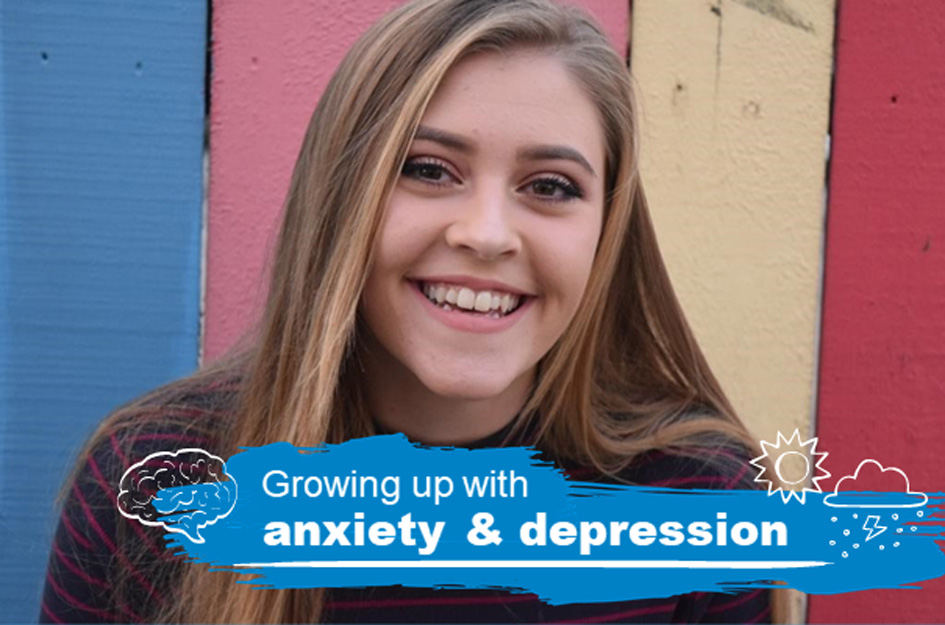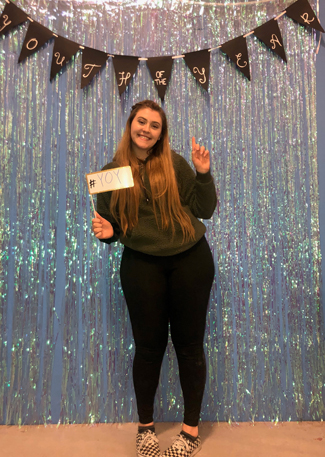

Symptoms of anxiety and depression in teens are on the rise as youth mental health needs trend upward. Club alumna Laine S. shares her personal experiences being diagnosed with anxiety and depression from an early age and her hopes for all students to have access to mental health resources and supports
When I was 8 years old, I didn’t know how to say I had anxiety – but I felt it. When people asked, “Why are you so sad all the time?” I didn’t have an answer for something that felt so out of my control.
If you’ve never experienced anxiety, here’s how it feels to me:
Picture a cartoon, where two characters are balancing on a log as it races down a river. The log keeps spinning, and they’re running in place to stay on top. Then one of them falls off, and it’s just me, trying to support myself on the log, running as fast as I can as the river keeps rushing on, and I see rocks up ahead.
Depression? It’s like you’re inside a giant hoodie with the hood up and the strings drawn. And you’re super small in the middle of the hoodie. And you’re just there.
 Laine served as Boys & Girls Clubs of America's 2020-21 Southwest Youth of the Year, representing kids and teens across the Southwest region.
Laine served as Boys & Girls Clubs of America's 2020-21 Southwest Youth of the Year, representing kids and teens across the Southwest region.I was diagnosed with anxiety and depression at the age of eight, and for most of my childhood, it often felt like people didn’t know how to support me. I've always lived in a single parent household and my mom struggles with her own mental health issues, so I was always bouncing from our house to my grandparents’ house to my mom’s friends’ houses.
As a young person, you're struggling with so much and you’re often putting on a front or suppressing how you’re feeling. I would feel so low, like I couldn’t even get out of bed to go to school, but I’d hear labels like “oh, she is being lazy” or “that kid just doesn't want to work” and I’d miss the signs of what was really going on.
In high school, I struggled with suicidal ideation and addiction. My school was unsure how to support me. When my anxiety showed itself as panic attacks during marching band, they considered asking me to leave because they weren’t sure how to address it. In my teen years, I went to rehab for addiction.
During that time, I reached out to my Boys & Girls Club, where I’d been a member since the age of five, because I missed it. I was really scared to go back and worried how they would see me – before, I’d been a role model at my Club, a junior staff member, always helping out. So I told them, “Hey, I'm going through rehab. And if you want to kick me out, I understand.”
But my Club said, “No, no, we want you here. We want to help you reach your recovery goals.”
My Club had always been there for me, but right then they gave me a place to belong when I needed it most.
Now, I’m a sophomore in college, double-majoring in sign language interpreting and biology – I hope to someday become a forensic pathologist.
I also work part-time at my local Boys & Girls Club, which is based at a high school. We have amazing mentors and staff who know how to really talk to you about your mental health, and now I’m a mentor for kids who needed what I needed – someone to help. After my personal experiences, I strongly believe that every student should have the right to mental health care, support and resources.
Your mental health struggles don’t just go away one day. But I’ve learned there are ways that you can cope with it. You can seek out a support system – like my Boys & Girls Club was for me. I also like to go outside to spend time with nature. I practice gratitude and writing lists of what I’m grateful for. I take anxiety medication when I feel I need it.
And I just want to give this message to all youth: if you're struggling with mental health, know that you're not a label. You're not anxiety. You're not depression. You are you, and you do not deserve to be suppressed by a label of mental illness. You are so many things and you should get to be you, and that includes being your best you – whatever that may be.
And if you’re ready to ask for help, find someone you trust and ask. Find your support system. Find your coping mechanisms. When you’re ready, they’re there for you.
Learn more about how Boys & Girls Clubs support youth mental health and find resources to support the young person in your life.
Every young person, like Laine, deserves a safe, positive environment in which to learn and grow. Help Boys & Girls Clubs across the country provide mentors, meaningful experiences and mental health support to kids and teens who need it most.
We use cookies to enhance your experience. Learn More.
Boys & Girls Clubs of America uses cookies to give you the best experience on our website. Read about cookies in our privacy policy. By closing this message, you consent to our use of cookies on this device in accordance with our policy unless you have disabled them.